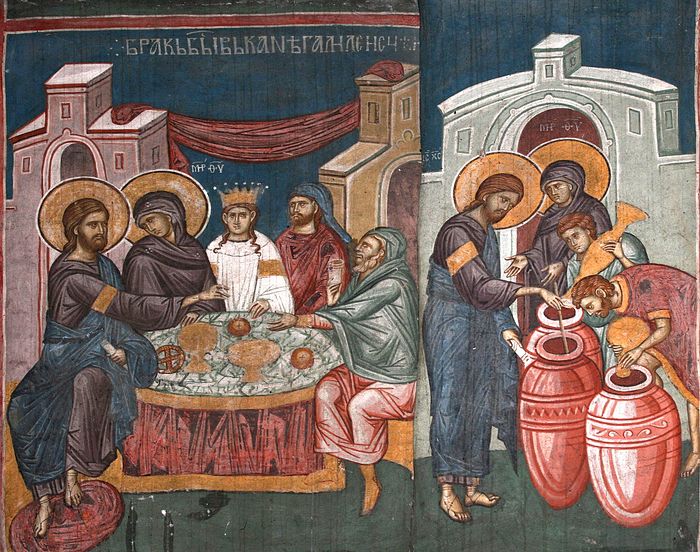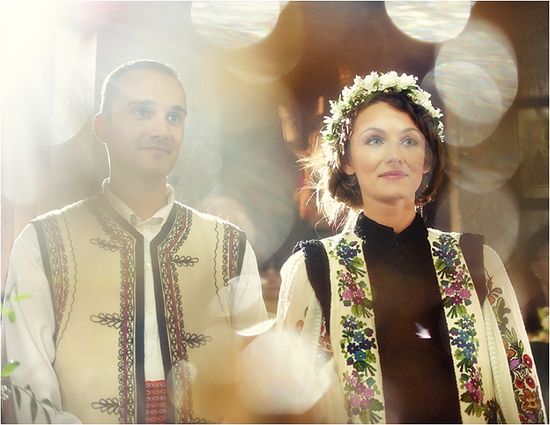In the Orthodox service of Holy Matrimony, we read Ephesians 5:21-33 as the Epistle for the Sacrament:
Be subject to one another out of reverence for Christ. Wives, be subject to your husbands, as to the Lord. For the husband is the head of the wife as Christ is the head of the church, his body, and is himself its Savior. As the church is subject to Christ, so let wives also be subject in everything to their husbands. Husbands, love your wives, as Christ loved the church and gave himself up for her, that he might sanctify her, having cleansed her by the washing of water with the word, that he might present the church to himself in splendor, without spot or wrinkle or any such thing, that she might be holy and without blemish.
Even so husbands should love their wives as their own bodies. He who loves his wife loves himself. For no man ever hates his own flesh, but nourishes and cherishes it, as Christ does the church, because we are members of his body. “For this reason a man shall leave his father and mother and be joined to his wife, and the two shall become one flesh.” This mystery is a profound one, and I am saying that it refers to Christ and the church; however, let each one of you love his wife as himself, and let the wife see that she respects her husband.
The reading causes consternation for some because it seems to reflect an antiquated worldview that doesn’t coincide with our ideas of gender equality. Additionally, by using the language of being subject one to another it raises concerns about abuse. Some of these concerns result from our English translations of the text, some from past experience in patriarchal cultures, and some from current societal emphases on the individual as being a more important social unit than any other including the marital union.
If we look at the entirety of Ephesians 5, we see it is offering instruction in how Christians are to behave in daily life. As St. Paul is unfolds his instruction he lists these things which are intended for all Christians, both male and female, to maintain in all their relationships:
1) Speaking to each other in Psalms & hymns (vs 19)
2) Singing from the heart
3) Giving thanks always for all things (vs 20)
4) Being subject to one another (vs 21)
Those four points are St. Paul’s ideal for how we Christians are to relate to any other Christian at any given time. It is a harmonious view of relationships involving speaking in lyrical verse and singing to each other.
Being subject to one another is just one of four ways we Christians are to relate to each other, and we need to note this is for all Christians and all relationships between Christians. St. Paul doesn’t say only women are to be subject to men, but each Christian should embrace humility and love which means considering other Christians as better than themselves (Philippians 2:2-8), and so being willing to submit to their judgments and ideas. This is easy to do if the other is being equally submissive and not trying to lord it over you—something also forbidden Christians in how they relate to each other (Mark 10:42-45).
When St. Paul mentions this fourth directive on how to relate to each other, he then seems to go into a bit of an excursus, giving an example of what he means. We can read the text like this:
Being subject to one another—for example, wives be subject to your own husbands (vs. 22)
St. Paul doesn’t say at this point that all women Christians are to be subject to all men. He gives a specific example of what he means that we all should be subject one to another. Christian wives are subject to their own Christian husbands; he specifies each wife is to be subject to her OWN husband. Not to all husbands in general, not to all males or men. All St. Paul is doing is giving an example of what he means. He then goes on in vs. 25 describing what it means for husbands to also be subject to their wives: They are to love their wives as Christ loved the Church, dying for her rather than lording over her. Jesus did not lord it over his disciples or anyone else. He wasn’t abusive at all, but rather laid down His life for the sake of those He loved.
Where people get into trouble with this Ephesians 5 text is when they read it only literally and fail to see that St. Paul’s mind was far from a solely literal or legal point of view. St. Paul in this very text shows us where his mind really is:
For this reason a man shall leave his father and mother and be joined to his wife, and the two shall become one flesh” [Genesis 2:24]. This mystery is a profound one, and I am saying that it refers to Christ and the church…
Paul takes the law, he takes a very literal text from Genesis (2:24) about human marriage and says this text is really a mystery about Christ and the Church. He is interpreting Genesis 2:24 in a mystical and spiritual way. One could easily argue with him and say, “No, it’s not, it’s just about male and female marrying each other.” But Paul is using Christian exegesis—he is claiming what Jesus Himself claims—Moses wrote about Christ (John 5:39-46; Luke 24:27, 44-45). Paul sees husbands and wives being subject to each other not as part of human law, but part of the mystery of Christ and how Christ loves us. Christ said we are to love one another as he loves us (John 13:34-35). St. Paul is simply saying the same thing. Paul reinterprets the literal text of the law in a very mystical way.
We also get a sense of marriage as a mystery in the Matrimony service from the Gospel we read, John 2:1-12, which is not a law about marriage, but Christ blessing a marriage—changing water into wine—it is another text about mystery, a mystical understanding of marriage. Marriage is not about law, but about blessings, abundance, grace, a miracle of abundance. We don’t read in Matrimony a text like Mark 10-5-9 in which marriage is promulgated as a law of God joining two together and humans being forbidden to break the law. Rather, we read about Christ’s presence at a wedding, and how that in itself created a blessing for the bridal couple, and brought about a great miracle, which is the mystery of Christ’s presence in our lives.
We see in Ephesians 5 that St. Paul himself reads the text of Genesis 2:24, of the Torah, of the Law, not literally, but mystically and spiritually. So why do we imagine that we are to read St Paul only literally? St Paul himself wanted us to get a mystical or spiritual meaning from the literal text. If we hear the Ephesians 5 text only in a literal, legalistic way, we are not hearing St. Paul at all. So rather than our feeling uncomfortable with the literal meaning of the text, we need to really read St. Paul and contemplate how marriage is related to the love that Christ has for his Church or more straightforwardly, how Christ loves us. The couple is to become an example of Christ’s love for them and for all the world. We read Ephesians 5 at the sacrament of marriage because it tells the newly wed couple how they are to live in relationship to each other. They are to love each other, and that means denying the self, putting the other ahead of the self, of subjecting one’s own will and desires and wishes to the good of the other. If the language of being subject to one another hinders you from being Christ like, then find the language and the example of how to be more Christ like in your love for one another. But there is goodness in Paul’s language, for Paul is describing how Jesus loves us—he subjected Himself to death for our sake (Philippians 2:5-11).
The Christian couple is to be a visible reality of the mystery of Christ’s love for us. Christ came and loves us—but He didn’t love us because we are perfect, sinless, flawless human beings—perfectly lovely and lovable. He loves us despite our faults, failures, foibles. That is how a Christian couple are to love each other so that marriage is a sign of God’s love in this world. In every marriage, each spouse realizes that the other is not perfect and faultless. That becomes exactly when each Christian spouse begins to love the other as Christ loves us. If the spouse is perfectly lovely and lovable, then loving them is just an instinctive reaction and not a choice. Love truly comes into play only when we realize the faults of the other and choose to love them. That is how Christ loves us.
One other thought, not from the mystical side of love and marriage. St. Paul’s comments are to husbands and wives (and do note literally he is not talking to all Men and Women in general but exactly to married husbands and wives). It is true his comments are not based in a modern assumption that male and female are totally equal or identical in nature. The equality of the genders was not really part of the ancient worldview. But probably even more grating to our ears is Paul’s language that we are to be subject one to another. We do not like the image of subjugation. It rubs us wrong entirely.
Nevertheless, Paul uses it as a way to describe how we are to relate one to another because it was something well understood in his world, and it describes how Christ loves us to the point of dying for us on the cross. So, whereas he addresses being subject to one another to all Christians, men and women, as the normal way for Christians to relate to each other, he also gives specific direction to a wife that the way she will be subject to the husband is the way that the church submits to Christ. All male and female Christians are to submit themselves to the lordship of Jesus Christ. That is also the particular way a wife subjects herself to her husband. This has nothing to do with abuse because Christ loves the church, he doesn’t abuse her, sexually, physically, emotionally, verbally or in any other way. That is why being subject to Christ can be an image of how a wife should love her husband.
As for the husband, St. Paul says FOUR times that the way in which the husband subjects himself to his wife is LOVE. He repeats this Four times in 5 verses, we get the sense that he is being a parent—how many times do I have to tell you husbands to love your wives? Maybe in his mind, the husbands are slow learners because he keeps repeating the instruction. On the other hand, when Paul told the wives to be subject to their husbands he adds only one direction—respect your husband. He doesn’t repeat this instruction to the women, apparently he thought the wives learned in one lesson.
There is another lesson here about marriage. St. Paul treats men and women not as entirely equal or identical in characteristics. We would do well to remember that marriage is often not about equality, because once spouses begin measuring the behavior of each other in equal terms, the marriage is in trouble. Many marital counselors point out that when spouses start counting rights and wrongs and who does more for whom, that marriage is headed in a wrong direction. You cannot be constantly measuring whether you are doing more than your spouse in everything, nor keeping a record of rights and wrongs (1 Corinthians 13:4-7). And certainly a sign that a marriage has problems is when one or both spouses keeps a ledger accounting for everything they do and measuring it against everything the other does or fails to do. Such exact measuring is not love. Love means you keep doing what you need to do and you don’t do it just to get an equal amount in return (Luke 6:35). Hopefully in a marriage, both spouses are meeting the needs of the other, but at any one time in any marriage one spouse may have to contribute more to the marriage than the other to make the marriage succeed. Those imbalances are a normal part of love. So if St Paul gives us words that seem to indicate there is inequality in marriage, on a certain level he is correct. If you are caught up only in measuring what is fair, your marriage will not be based in love, but will become a system of debts and slavery. Instead, true love means at times giving or receiving more than one’s spouse. We get this sense in another context where St Paul says:
I do not mean that others should be eased and you burdened, but that as a matter of equality your abundance at the present time should supply their want, so that their abundance may supply your want, that there may be equality (2 Corinthians 8:13-14).
For St Paul equality isn’t a matter of people being equal in everything, but rather equality for him means in love one who has more shares with the one has less—that is what makes us equals. He doesn’t think there is gender equality, but he certainly believes that two people can mutually love and support each other in a complimentary fashion and this creates equality.
A final point based upon all else that has been said: don’t forget about the Scriptures because you think they have antiquated ideas. Indeed they were written long ago in a very different cultural milieu, and some of their assumptions are not our assumptions about life. Nevertheless, the Scriptures still speak to us about the mystery of God’s love and we can find God’s love for us in them if we ourselves move beyond just looking to the Scriptures for laws and rules and regulations and read them as St Paul read them—to reveal the mystery of Christ to us. We read Ephesians 5 at our service of Holy matrimony because this chapter speaks to us about the mystery of God’s relation to us and how we are to relate one to another as Christians.
Used with permission.









